九年级英语unit2 Section A 1a-2c
人教版九年级英语全册导学案(完美版)

第1课时Unit 1 Section A 1a-2c【Le arning objectives】1 Knowing:flashcard,aloud,pronunciation,skill,voice2 Habit-forming: How do you study for a test? I study by.........3 Communicating:Talk about how to study freely【Important leaning points】运用by doing 谈论学习方式【Learning process】一、自主学习(教师寄语:相信自己,一定能行!)Task1:Talk about how to study for the test1、完成下列短语和朋友一起学习制作抽认卡看课本制作词汇表听磁带向老师寻求帮助2、理解下列对话,并利用上面词组练习:A:How do you study for a test? B:I study by working with a group.A:How does Bob study for a test? B:I study by marking flashcards.3 、听录音,完成1 bTask2: Talk about how to learn English1、小组练习,利用下列句型谈论怎样学习英语.A:How do you learn English? B:I learn by ......A:Do you learn by.........? B:Yes,I do. /No, I don't.2、理解2a、2b中的句子,找出下列短语:看英文光碟和朋友连交际大声读练习发音小组学习说的技能做.........太难3、听录音,完成2a、2b4、根据听力内容,练习上面对话。
5、读听力材料,理解以下知识点:the best way to learn EnglishWho has an idea?keep a diary in Englishlook up new words in a dicctionary二、Cooperration (教师寄语:学会合作,提高自我)根据听力材料,小组自由讨论如何学好英语?三、Summary根据下面的句子,总结by的用法和含义:1、I have to be in bed by 10 o'clock.2、There is a tree by the river.3、I go to work by bus.4、The boy is sent to the hospital by a kind man.5、You can learn English by working with friends.四、诊断评价(一)补全单词:1、It's a good way to read a2、The boy often l up the words in the dictionary.3、Do you have an i about weekend?4、K a diary helps to write English every day.5、The girl often learn by a the teacher for help.6、What about reading about to practise p?(二)补全短文:A:Tom,I know you (数学学的很好)last term.How do you learn math?B:I learnt it (通过做很多题) A:What else?B: (通过向老师寻求帮助)A:Did you learn ?(通过小组学习)B: Yes, i did. ( Lucy也是)【课后反思】(教师寄语:从不断反思中完善自己,提高自己)第2课时Unit 1 SectionA 3a-4【Learning objectives】1.Knowing: specific, memorize, grammar, differently, frustrate, frusratin g, quickly, add,not at all, excited, end up.2.Understanding:Be able to understand the meaning of the passage in 3 a.municating: ---How do you learn English?---I often write vocabular y lists.【Important points】1.Understanding:Be able to understand the meaning of the passage in 3 a.municating: ---How do you learn English?---I often write vocabular y lists.【Learning process】一、自主学习Task1学习第4部分短语,谈论自己如何学习英语。
人教版九年级全册第二单元Section A 1a2d教案
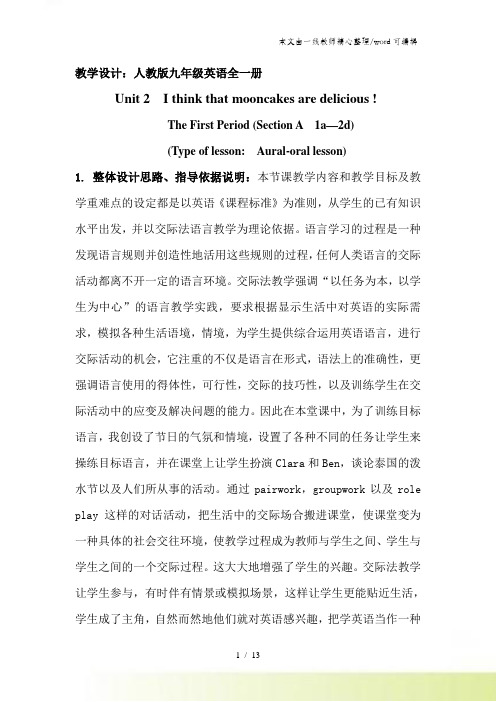
教学设计:人教版九年级英语全一册Unit 2 I think that mooncakes are delicious !The First Period (Section A 1a—2d)(Type of lesson: Aural-oral lesson)1. 整体设计思路、指导依据说明:本节课教学内容和教学目标及教学重难点的设定都是以英语《课程标准》为准则,从学生的已有知识水平出发,并以交际法语言教学为理论依据。
语言学习的过程是一种发现语言规则并创造性地活用这些规则的过程,任何人类语言的交际活动都离不开一定的语言环境。
交际法教学强调“以任务为本,以学生为中心”的语言教学实践,要求根据显示生活中对英语的实际需求,模拟各种生活语境,情境,为学生提供综合运用英语语言,进行交际活动的机会,它注重的不仅是语言在形式,语法上的准确性,更强调语言使用的得体性,可行性,交际的技巧性,以及训练学生在交际活动中的应变及解决问题的能力。
因此在本堂课中,为了训练目标语言,我创设了节日的气氛和情境,设置了各种不同的任务让学生来操练目标语言,并在课堂上让学生扮演Clara和Ben,谈论泰国的泼水节以及人们所从事的活动。
通过pairwork,groupwork以及role play这样的对话活动,把生活中的交际场合搬进课堂,使课堂变为一种具体的社会交往环境,使教学过程成为教师与学生之间、学生与学生之间的一个交际过程。
这大大地增强了学生的兴趣。
交际法教学让学生参与,有时伴有情景或模拟场景,这样让学生更能贴近生活,学生成了主角,自然而然地他们就对英语感兴趣,把学英语当作一种乐趣。
本课还运用任务型教学方式。
任务型教学就是以具体的任务为学习动力或动机,以完成任务的过程为学习的过程,以展示任务成果的方式来体现教学的成就。
本节课教学行为的每一个步骤都是在完成不同任务中进行的。
如:1a, 将图片与文字描述相联;1b, 2a, 2b听力训练后,完成不同任务的练习;1c, 2c, 2d 都是编对话、完成角色表演的任务等。
新目标英语九年级Unit 2全单元课件
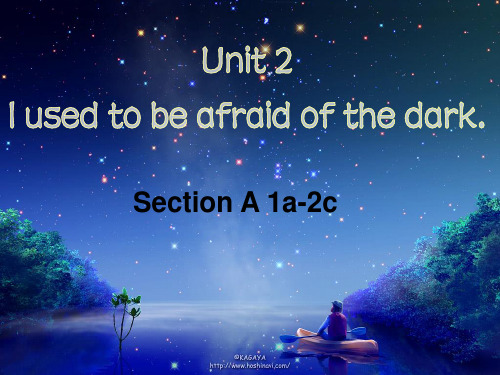
long hair short hair straight hair
build
heavy
hair
medium build
thin
have/has (big) eyes,
curly hair blonde hair brown hair ……
you? B: Yes, I did. / No, I didn’t.
Listen and check √( ) the words you hear.
_____shy
______ serious
__√___friendly ______ funny __√___ outgoing ___√__ quiet
wear(s) glasses/clothes …
He was short when he was a child, but he is tall now.
He used to be short, but now he is tall.
quiet …
outgoing …
She used to be …, but now she is … .
What did you use to eat ? What do you eat now?
Activity Eat…. Read…
Watch…on TV Do…at school
Past
Now
What did you use to eat ?
What do you eat now?
Activity
My partner used to be is still afraid of… afraid of….
the dark being alone snakes flying in an airplane big dogs high places speaking in front of a group
人教版九年级英语上册Unit 2 Section A 第一课时(1a-2d)
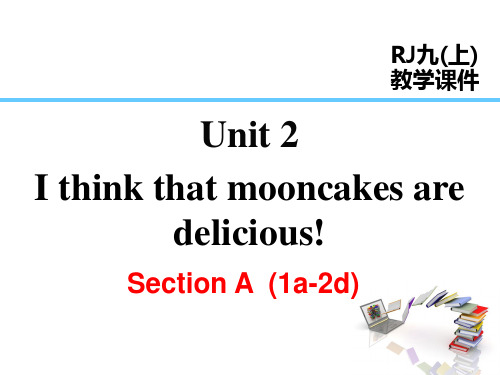
Unit 2 I think that mooncakes are
delicious!
Section A (1a-2d)
·Key words & phrases: mooncake, lantern, stranger, relative, pound, the Water Festival, the Dragon Boat Festival, the Chinese Spring Festival, the Lantern Festival, put on, be similar to, throw...at..., time for doing sth., wash away
n. 灯笼
1b Listen and circle T for true or F for
false.
1. Bill thinks that the races were not that interesting to watch. T F
2. Mary thinks that the teams were fantastic. T F
1. stranger n. 陌生人(可数名词) 例:It is dangerous for children to go with strangers. 对孩子们来说,跟陌生人走是危险的。
助记:stranger-er=strange(adj. 陌生的,奇怪的) 例:Nobody can explain her strange behaviour. 没有人能够解释她奇怪的行为。
·Key sentences:
1.I think they’re fun to watch. 2.Bill and Mary believe that they’ll be back next
人教版九年级英语全册教学设计:Unit 2 section A
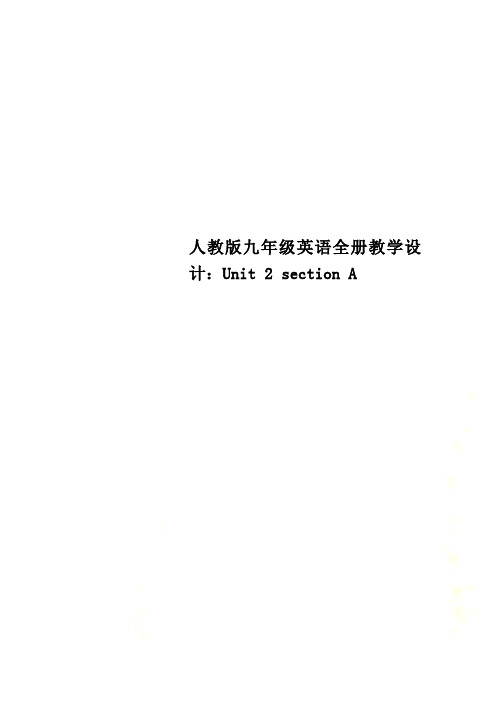
人教版九年级英语全册教学设计:Unit 2 section A学情分析教学目标在本节课结束时,学生将能够:谈论自己了解的节日并对某个节日、某种节日特色等发表观点。
知识与能力:学会使用What do you like best about…?句型来询问对方最喜欢的节日及节日特色;能够使用准确的语言描述自己喜欢的节日、节日特色及理由。
过程与方法:采用自主学习、小组合作探究、Role-playing的学习策略,利用幻灯片、录音机来展开课堂教学、Pairwork 问答式的口语交际活动或游戏等小组活动,进行“谈论节日和节日特色”的课堂教学和练习。
本课时的教学法建议:口语教学——采取Pairwork问答式的口语交际活动互相操练;听力教学——采取回答问题和判断正误的方式进行;词汇教学——采取情景介绍或演示对比的方式进行教学,让学生在情境中操练、理解含义,并学会运用。
情感态度与价值观:通过谈论节日及节日特色,加强学生对于不同国家和地区文化风俗的了解重难点:1.学会运用宾语从句来表达句子。
2.学会运用what和how表达对某事物的感叹。
教学方法1.利用情景图导入后,以小组活动、角色表演等形式,提起学生学习的兴趣。
2.语法教学可采用任务教学法和情景教学法,采用pair work、group work 等问答式的口语交际活动和听力训练。
3.阅读教学可采用任务型教学法和带问题自主探究等学习策略,理解节日的真正内涵,体会作者的观点,正确陈述自己对节日的感受和看法,为书面表达打好基础。
教学资源PPT, handouts, MP3, video …教学过程教学环节教师活动学生活动设计意图Ste p 1 情境导入Teacher: As we all know thatour country-China is an oldcountry with long history andgreat different colorfulcultures. And now we stillhave many festivals tocelebrate it every year.(4分钟)Teacher: Can you name somefestivals you know to me?Students:__________________________________①The Spring Festival.师生交流导入话题通过提问激发学生的表达欲望,使学生体验到了掌握知识的个人意义。
九年级英语上册+Unit2+sectionA(1a—2d)

I wonder ..., I don't know ... 这两个短语都 可译成“不知道”。其区别是:
I wonder ...作“不知道”解时, 其中含有 “想知道”的意思; I don't know只是用来 陈述对某事“不知道”这一事实。例如:
I wonder what you call this. 不知道你们把这个叫做什么。
2a Listen and circle the correct words.
1. Wu Ming and Harry are cousins / strangers / friends.
2. Wu Ming went to Singapore / Hong Kong / Macao for his vacation.
知识拓展
“in+一段时间” 和 过 去 式 连 用 , 表 示 “在某段时间内” I finished my homework in 2 hours.
as Yunnan, China. It is called the “Water Festival” by Westerners because people pour water at one another as part of the cleansing ritual ['rɪtʃʊəl] (仪式) to welcome the new year. The act of pouring water is also a show of blessings and good wishes. It is believed that on this Water Festival, everything old must be thrown away, or it will bring the owner bad luck.
九年级英语unit2(全单元)课件
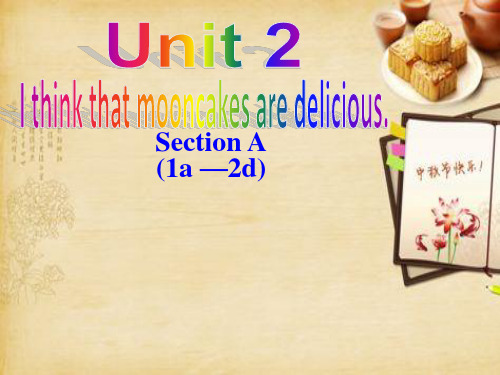
2. Why is she going there in the hottest month?
Because there is a Water Festival.
3. When is the Thai New Year?
It's from April 13th to April 15th.
2a Listen to the conversation between Wu Ming and Harry and circle the correct words “adj“奇怪,陌生的 in the sentences. strange stranger “n”陌生人
stranger I am a_________(strange) here. Could 1. Wu Ming and Harry are cousins / you please tell me where the post office is?
['dræ ɡən] n. 龙;
The Water Festival 泼水节
d a c b
Байду номын сангаас
1.(1)What+a/an+形容词+可 数名词单数形式 (+主 语+谓语动词…)! (2) What+形容词+不可数名词/可数名词复数 (+主语+谓语动词…)! 2. How+形容词/副词 (+主语+谓语动词…)!
Shopping
Dragon Boat Festival in June
put on your coat穿上你的外套
put off having a party推迟举行聚会 2c Role-play conversations between Wu put away your clothes 收拾好你的衣服 Ming and Harry. Use the information in 2a put up the sign张贴标志 and 2b or makeput your own conversations. up your hands举起你的手
初三英语第二单元预习案
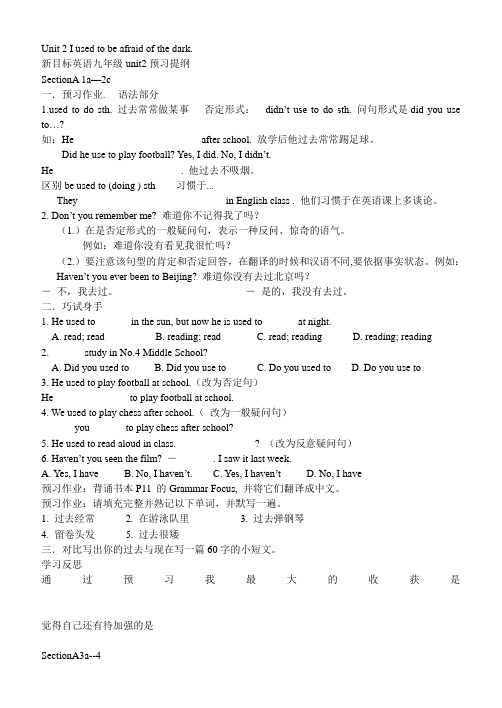
Unit 2 I used to be afraid of the dark.新目标英语九年级unit2预习提纲SectionA 1a—2c一.预习作业. 语法部分ed to do sth. 过去常常做某事否定形式:didn’t use to do sth. 问句形式是did you use to…?如:He____ ____ _______ ________ after school. 放学后他过去常常踢足球。
Did he use to play footbal l? Yes, I did. No, I didn’t.He ____ ______ _____ ________. 他过去不吸烟。
区别be used to (doing ) sth 习惯于...They___ _____ ____ _____ ____ _____ in English class . 他们习惯于在英语课上多谈论。
2. Don’t you remember me? 难道你不记得我了吗?(1.)在是否定形式的一般疑问句,表示一种反问、惊奇的语气。
例如:难道你没有看见我很忙吗?(2.)要注意该句型的肯定和否定回答,在翻译的时候和汉语不同,要依据事实状态。
例如:Haven’t you ever been to Beijing? 难道你没有去过北京吗?-不,我去过。
-是的,我没有去过。
二.巧试身手1. He used to ______ in the sun, but now he is used to ______ at night.A. read; readB. reading; readC. read; readingD. reading; reading2. ______ study in No.4 Middle School?A. Did you used toB. Did you use toC. Do you used toD. Do you use to3. He used to play football at school.(改为否定句)He ______ ______ to play football at school.4. We used to play chess after school.(改为一般疑问句)______ you ______ to play chess after school?5. He used to read aloud in class. ______ ______? (改为反意疑问句)6. Haven’t you seen the film? -_______. I saw it last week.A. Yes, I haveB. No, I haven’t.C. Yes, I haven’tD. No, I have预习作业:背诵书本P11 的Grammar Focus, 并将它们翻译成中文。
人教新目标九年级英语 Unit2 Section A (1a-2d) 同步训练(含答案)

人教新目标九年级英语Unit2 Section A (1a-2d)同步训练一、单项选择( ) 1. —I wonder ________ or not John can come for the meeting tomorrow.—He has gone to Beijing on business.A.when B.where C.whether D.if( )2.The cake ________ delicious. I'd like to have another one.A. tastesB. looksC. soundsD. feels( )3. —What did your geography teacher say just now?—He said that there ________ eight planets in the solar system.A.would be B.are C.were D.will be( )4.—I'd like to choose light blue as the colour of our bedroom.—________. The colour brings us a calm and peaceful feeling.A. No wayB. Sounds greatC. In your dreamsD. I can't( )5. ________ delicious the food is!A.How B.What a C.How a D.What( )6. He likes Sunday ________ in a week because it is his happiest time to play football.A. betterB. wellC. bestD. least( )7. —What do you think your life will be like ________ twenty years?—Yeah.I have thought about it ________ three years.A.before;for B.after;inC.in;for D.for;for( )8. 13.—Oh,my dear.I have ________ two kilograms this month.—Don't worry.It is normal for a growing teenage girl.A.put on B.put off C.put up D.put down( )9. I really need to take more exercise because I'm ________ weight.A. putting downB. putting onC. putting offD. putting away( )10. —Excuse me,I wonder ________ there is a bus here to go to Moon Restaurant.—Yes,Bus No.5.A.that B.when C.why D.whether( )11. Don't ________ today's work for tomorrow. Today's work must be done today.A. put offB. put outC. put upD. put on( )12. —Kangkang,tell us something about ________ in your hometown?—Usually on this day,people eat zongzi in memory of Qu Yuan.A.the Spring FestivalB.the Lantern FestivalC.the Dragon Boat FestivalD.the Mid-Autumn Festival( )13. Our school has ________ a sign at the gate, saying “Greet your child with a smile, not a mobile”.A. put upB. put offC. put onD. put out( )14. —My mother cooks delicious food every day.I've ________ six pounds.—I think you should do more exercise.A.put away B.put offC.put on D.put up( )15. It sounds like ________, but you should discuss it with your parents first.A. goodB. wellC. a good planD. good plan( )16. —All of my classmates have passed the PE test.—________ exciting the news is!A. WhatB. What anC. HowD. How an( )17. Yesterday the teacher told us the earth ________ the sun.A.goes around B.went aroundC.is going to around D.would go around( )18. Our dreams are ________ theirs. We all hope to live in a peaceful world.A. same toB. the same asC. same asD. the same to( )19. —________ wonderful the toy car is!Did you make it yourself? —Oh,my uncle sent it to me as my birthday present.A.What a B.How C.What D.How a( )20. —My parents and I went to the farm yesterday. I rode a horse there. — ________.A. Sound wellB. It sounds like funC. It sounds like goodD. Sound good二、词汇运用A) 根据句意及首字母提示,写出句中所缺单词。
人教版go for it九年级英语 Unit 2 Section A (1a-2d)【精品课件】
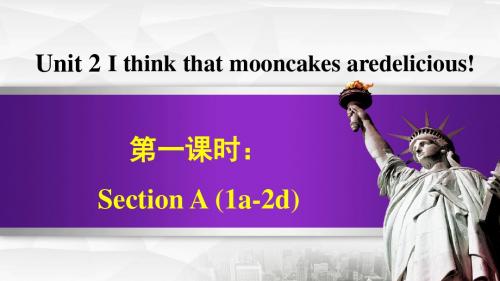
the races.
TF
1b
Mary: What a great day! Bill: Yes, it was really fun! Mary: What did you like best? Bill: I loved the races! They were really interesting to watch.
day! I’ve put on❷ five pounds❸! A:I guess the food was delicious,right?
知识点 2 put on 增加(体重);发胖 eg:I can eat whatever I want because I never put on weight. 我可以想吃什么就吃什么因为体重从来不增。
【注意】that修饰形容词时是副词,并非指示代词。
典例 —Did you wash your new suit in hot water?
—Of course not. I am not ____B____ foolish.
A.more
B.that
C.very much
D.too
【点拨】more更;that那么;very much 非常,修饰动词; too太。句意:—你把你的新衣服放热水里洗的吗?—当然没 有,我没那么愚蠢。that 相当于形容词so,意为“如此;这 样;那么”。
watch.
TF
2.Mary thinks that the teams were fantastic.
TF
3.Bill wonders whether they’ll have zongzi again next year.
TF 4.Bill and Mary believe that they’ll be back next year to watch
人教版九年级英语 Unit2 知识点讲解及同步练习
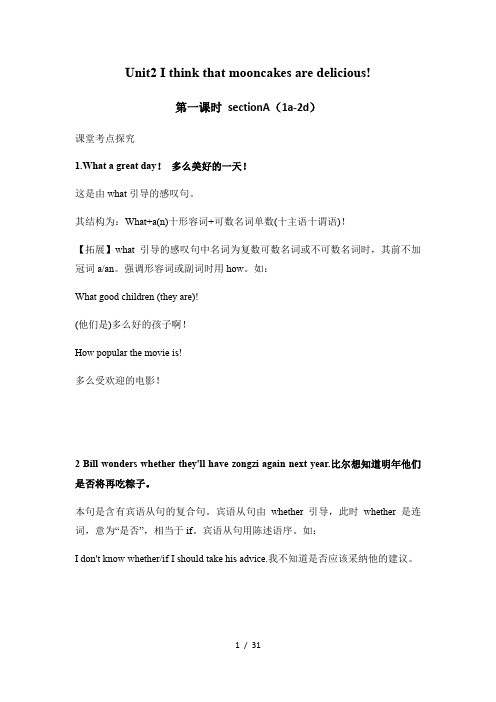
Unit2 I think that mooncakes are delicious!第一课时sectionA(1a-2d)课堂考点探究1.What a great day!多么美好的一天!这是由what引导的感叹句。
其结构为:What+a(n)十形容词+可数名词单数(十主语十谓语)!【拓展】what引导的感叹句中名词为复数可数名词或不可数名词时,其前不加冠词a/an。
强调形容词或副词时用how。
如:What good children (they are)!(他们是)多么好的孩子啊!How popular the movie is!多么受欢迎的电影!2 Bill wonders whether they'll have zongzi again next year.比尔想知道明年他们是否将再吃粽子。
本句是含有宾语从句的复合句。
宾语从句由whether 引导,此时whether 是连词,意为“是否”,相当于if。
宾语从句用陈述语序。
如:I don't know whether/if I should take his advice.我不知道是否应该采纳他的建议。
3.put on 的用法put on意为“增加(体重);发胖”。
如:He has put on weight duringthe last two months.他过去两个月里体重增加了。
【拓展】put on 还有“穿上;戴上;上演;举办”等意思。
4 pound n.磅:英镑当可数名词pound 表示重量单位时,意为“磅”;表示货币单位时,意为“英镑”,其符号是£。
5.I'm going to Chiang Mai in two weeks.我打算两周后去清迈。
in two weeks 意为“两周以后”“in十一段时间”表示“在多长时间以后”,常用于一般将来时的句子中,对它提问用how soon。
如:—How soon will you be back?你们还有多久回来?—We will be back in an hour.我们会在一个小时后回来。
人教英语九年级上Unit2第1课时 SectionA1a-2d
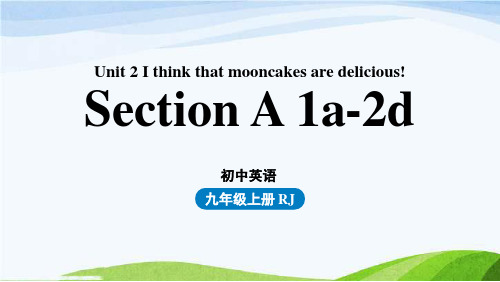
What did you do on your vacation?
I guess the food was delicious, right?
I visited my cousins. I think that we ate five
meals a day! I’ve put on five pounds!
the Spring Festival 春节
the Lantern Festival 元宵节
Qingming Festival/ Tomb Sweeping Day
清明节
the Dragon Boat Festival 端午节
端午节视频
Mid-Autumn Day 中秋节
Teachers’ Day 教师节
1a Look at these pictures. Do you know what festivals they are?
a
c
b
d
1a Match the pictures with the descriptions.
1. ___d___The Water Festival in Thailand
watch the races.
TF
Language points 1. Bill thinks that the races were not that interesting to watch.(教材P9 1b) that 的用法 本句中第一个that是宾语从句的引导词,第二个that是
副词,意为“那么;那样”,表示程度,修饰形容词
A. Zongzi. B. Mooncakes.
C. Rice.
1c Talk about the festivals in 1a. What do you like best about the Dragon Boat Festival?
九年级英语全册Unit2Ithinkthatmooncakesaredelicious

Unit 2 I think that moon-cakes are delicious.【学习内容】Unit 2 I think that moon-cakes are delicious. Section A 1a-1c【学习目标】1.that,whether引导的宾语从句。
2.通过对话和听力, 学会运用guess, wonder, believe, think作出个人反应。
3.感叹句。
【自学检测】短语翻译。
1.泰国泼水节________________________2.香港龙舟节____________________3.北京春节_______________________4.江西元宵节____________________5.What a great day!6.比尔想知道明年他们是否还会吃粽子。
【语法聚焦】1.感叹句结构感叹句是表示喜怒哀乐等强烈感情的句子。
一般说来, 感叹句是由 what 或 how 开头的,其余与陈述句结构相同,句末用感叹号, 朗读时用降调。
由what引导的感叹句what修饰名词或名词短语,有以下两种形式:1. What +a(an)+(形容词)+单数可数名词+主语+谓语!如:What an apple this is! What a fine day it is!2. What+(形容词)+可数名词复数或不可数名词+主语+谓语!What kind women they are! What nice music it is!由How引导的感叹句: how用来修饰形容词、副词或动词。
其结构是:How+形容词(副词)+主语+谓语!How hard the worker are working! How quickly the boy is writing!【当堂检测反馈】根据汉语提示填空完成句子,每空一词1.多么美好的一天! a day!2.我猜想它有点太拥挤了。
2016年秋人教版九年级英语Unit2 Section A(1a~2d)教案(英语教案)

Unit 2 I thi nk that mooncakes are delicious!第一课时Section A (1a~2d)【学习目标】1.学习关于谈论节日的常用词汇与句型。
2.指导学生仔细聆听有关描述节日活动的对话,并使其学会运用所学内容谈论节日活动。
3.学生通过小组合作来学习节日,了解中西方的重要节日及风俗习惯,增长见识。
【学习重点】重点单词:mooncake,lantern,stranger,relative,pound【学习难点】通过交流表达和听力训练,引入谈论节日活动的话题来学习“What do you like best about…?”☞学习提示Leading in the topic with ppt pictures:There are many traditional festivals in China,such as Spring Festival,Dragon Boat Festival,Midautumn Festival.Which festival do you like best and why?Task 1☞学习提示Preview the words on P9-10,read the words by phonetic symbols,then mark the new words and Chinesemeaning.At last finish the tasks in 1a.【学法指导】►put on①put on是动词短语,在此意为“增加(体重)”。
②put on还表示“穿上”,强调穿的动作。
③put on还表示“上演”。
►sim ilar与same的辨析①similar是形容词,意为“相像的”。
常用结构be similar to意为“与……类似”。
②same也是形容词,意为“相同的”。
常用结构the same as意为“与……相同”。
人教版九年级英语全册Unit2 SectionA(1a-2d)+课件

Listen and find out Wu Ming’s and Harry’s opinions.
Let’s listen
Wu Ming believes that Hong Kong is a good place for shopping.
Wu Ming thinks
that he ate at least five meals a day.
2.
w__i_n_d__o_w_. s
Little kids and
even
parents
_d_r_e_s_s__u_ pas
ghosts
or
black
the Spring Festival, the Water Festival, the Lantern Festival, the Drogan Boat Festival, the Mid-autumn Festival
2.learn some new words and phrases.
relative, stranger, lantern, put on , throw..at..,wash away
ห้องสมุดไป่ตู้
泼向/洒向…
throw water at each other
I wonder
the Water Festival
if(是否)
you
love
water.
--I love the water.I think that it is exciting to throw water at each other.
A. the Water Festival B . the races C. the dragon boat teams
人教版九年级英语上册第二单元学案 Section A

人教版九年级英语上册第二单元学案Section AUnit 2Section A(1a-2c)学习目标1.掌握描写人物的技巧和词汇。
2.掌握下列知识点:■重点词汇:sure, used■重点短语:①used to ②wait a minute ③play the piano ④be interested in ⑤on the swim team■重点句型:①Mario,you used to be short, didn’t you?②Don't you remember me?■语法:used to句式的用法预习导学Ⅰ.英汉短语互译。
1.过去经常2.on the swim team3.弹钢琴4.wait a minute5.对……感兴趣Ⅱ.预习Section A(1a-2c)部分,完成下列句子。
6.I(过去)be short,but now I am tall.7.My sister used to(害怕)the dark.8.He used to be quiet,(是吗)?合作研讨一、重点单词与短语1.sure adv.的确【拓展】(1)be sure一定要;务必(2)make sure弄清楚;确保【跟踪训练】(1)人的确在变化。
People change.2.play the piano弹钢琴【精解】play与乐器类名词连用时,名词前要加定冠词the,而与球类名词连用时,名词前不要加定冠词the。
例如:play the violin拉小提琴;play soccer踢足球【跟踪训练】(2)她在四岁时学习弹钢琴。
She learned to at the age of four.3.be interested in对……感兴趣,后跟名词、代词、动名词或从句。
【拓展】其同义短语为take an interest in【跟踪训练】(3)我对他说的话感兴趣。
I what he said.二、重点句型与语法■句型Mario,you used to be short,didn't you?玛利奥,你过去个子矮,是不是?【精解】used to意为“过去经常;以前常常”,后跟动词原形,“used to do sth.”这一结构表示“过去常常做某事”,暗指现在不再做了。
2020人教新目标九年级英语上unit2知识提纲

【文库独家】Unit 2 Section A (1a-2d) 知识提纲一、词性转换1. strange adj. 陌生的→n. stranger 陌生人二、词法及句型1. little 后接(u)n 不可数名词“很少,几乎没有”表示否定含义。
a little . 后接(u)n 不可数名词“一点儿,”表示肯定含义。
few 后接(c)n.pl. 可数名词复数“很少,几乎没有”表示否定含义。
a few 后接(c)n.pl. 可数名词复数“有几个,有一些”表示肯定含义。
—Is your friend Tom still in Australia ?—I don’t know . I have information about him because we haven’t seeneach other for years .A a little , a fewB little , a fewC a few , a littleD few , a little2. put (pt. put pp. put ) 放put sth + 地点(用介词短语表示)I put my bike under the tree . 我把自行车放在了树下。
put on 增加(体重),发胖穿上,上演I can eat whatever I want , but I never put on weight .我想吃什么就吃什么,但是体重从来不增。
与put 有关的短语还有put away 把……收起来put up 举起,张贴put off 推迟,延迟put down 放下,写下put out 熄灭,扑灭()your sunglasses , Sally .The sun is so bright .A Put down B. Put up C. Put away D. Put on3. in two weeks 两周后in + 一段时间表示“在……之后”用于一般将来时用How soon 提问She has gone to Beijing , and she will be back in two days .她去北京了,她将在两天后回来。
- 1、下载文档前请自行甄别文档内容的完整性,平台不提供额外的编辑、内容补充、找答案等附加服务。
- 2、"仅部分预览"的文档,不可在线预览部分如存在完整性等问题,可反馈申请退款(可完整预览的文档不适用该条件!)。
- 3、如文档侵犯您的权益,请联系客服反馈,我们会尽快为您处理(人工客服工作时间:9:00-18:30)。
B: Not at all. You're ________ than me now. And I remember you ______
____ ________ basketball. What about playing basketball now?
兰河一中导学案设计
科目
英语
年级
九年级
设计者
徐楠
课题
Unit 2 I used to be afraid of the dark? Section A 1a-2c课型Biblioteka 新课课时1
设计时间
2012、9、13
学
习
目
标
知识与技能
used to的用法
过程与方法
能掌握“used to”sentence pattern的意思和用法。
情感态度
价值观
Talk about what you used to be like
重难点预测
重点
“used to”sentence pattern
难点
Talk about what you used to be like
学法
指导
Communicate with each other.
知识
链接
used to do sth.过去常常做某事。
2、读听力材料并归纳掌握如下短语和句子
弹钢琴__________________踢足球___________________
对…更有兴趣_________________在游泳队_________________
课前导入,温故知新。
二、
合作
探究
三、
小结
四、
达标
检测
五、
任务
布置
学习Grammar Focus中的句子,理解归纳used to的用法
学生总结知识点。
训练单词、口语。
巩固训练。
着重训练used to的用法。
评
价
反
思
用于过去式中,表示现在已不存在的习惯或状态.查阅资料,掌握used to的用法。
环节及时间分配
学习过程
设计
意图
一、
自主学习
一、自主学习
Task 1 : Warm—up
拿出两张照片,一张是现在的李雷,一张是五年前的李雷。Say:
T:LiLei is tall now. Was he tall five years ago?
5、used to的一般疑问式为: ________________________
总结: "used to"句型的陈述句、一般疑问句、否定句,举例说明。
________________________________________________
________________________________________________
A: OK. Let's ______.
(三)句型转换
He used to go to school by bus.
1.否定句:
2.一般疑问句及:
肯定回答:
否定回答:
3.反意疑问句
1.对于used to do sth.、be used to do sth.进行造句。
2.熟记本节课单词。
小组合作,理解归纳重点知识。
B: Hi, Li Lei. How are you?
A: _________. Wow, you have changed.
B: Really? How?
A: Well, you _________ _____ have long hair.
B: You remember that? Yes, I did.
1、used to意为:_________________________
2、used to后面加:____________________
3、used to的否定式有那两种形式:___________________
4、used to的反意疑问句: __________________________
S:No,he was short.
T:That is right. He was short five years ago,but now he is tall.
让学生回忆以前学过的词,完成1a,并用used to进行练习.
Task 2 :理解应用
1、口头描述Mario, Amy, Tina, Paula, Steve等人的过去。
3.Our head teacher is very s_____________. We often get nervous when
we see him.
4、He's i____________ in playing the piano.
(二)完成对话
A: Hey, Amy, it's _____ to see you.
________________________________________________
(一)根据句意和首字母完成句子
1.Amy used to ___________ (play) soccer.
2.His sister used to be quiet, now she is o____________.
